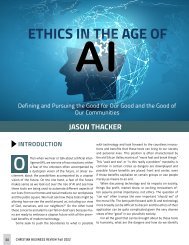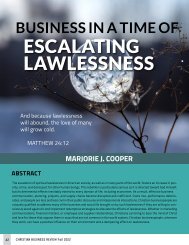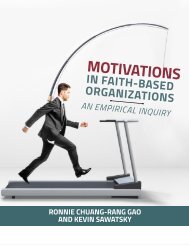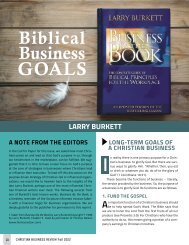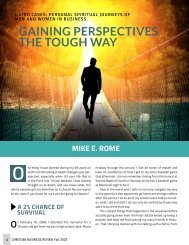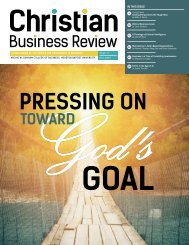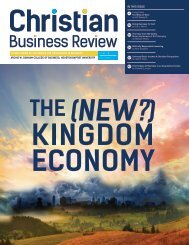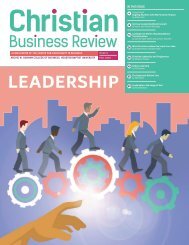Christian Business Review 2018: Kingdom Business in the Brave New World (Issue 7)
You also want an ePaper? Increase the reach of your titles
YUMPU automatically turns print PDFs into web optimized ePapers that Google loves.
economics, privacy, and ethics<br />
an email from Amazon.com? If <strong>the</strong> lady sell<strong>in</strong>g zucch<strong>in</strong>i at<br />
<strong>the</strong> farmer’s market asks you how old your kids are, she<br />
probably likes your kids. If Amazon.com asks <strong>the</strong> same<br />
question <strong>in</strong> an email survey, <strong>the</strong>y don’t like your kids. They<br />
want to know which toys to advertise to you. Openness<br />
won’t get you a relationship with Amazon, it will only get<br />
you targeted advertis<strong>in</strong>g and price discrim<strong>in</strong>ation.<br />
This is all to say that <strong>in</strong> an impersonal economy where<br />
<strong>in</strong>formation is a commodity, privacy concerns really are<br />
concerns about justice. We need to get privacy laws right,<br />
because gett<strong>in</strong>g <strong>the</strong>m right will allow commerce to happen,<br />
and will encourage private <strong>in</strong>stitutions that are trustworthy.<br />
Moreover, <strong>in</strong> <strong>the</strong> specialized economy that we<br />
<strong>in</strong>habit, if some level of privacy is not assured, <strong>the</strong> asymmetric<br />
<strong>in</strong>formation and asymmetric risk will push people<br />
away from each o<strong>the</strong>r, by push<strong>in</strong>g <strong>the</strong>m out of <strong>the</strong> market,<br />
and it will push ethical retailers out of <strong>the</strong> market as well.<br />
Privacy laws are often what keep people from us<strong>in</strong>g technology<br />
to take advantage of o<strong>the</strong>rs for profit. Thus we can<br />
th<strong>in</strong>k of a well-function<strong>in</strong>g set of privacy protections as an<br />
<strong>in</strong>stitution which preserves some level of community <strong>in</strong><br />
<strong>the</strong> case where commerce has already been severed from<br />
o<strong>the</strong>r community <strong>in</strong>stitutions.<br />
It is worth not<strong>in</strong>g, moreover, that <strong>in</strong> many cases <strong>the</strong><br />
protection of <strong>in</strong>dividual privacy will give consumers <strong>the</strong><br />
power to opt <strong>in</strong>to communities where <strong>the</strong>re is <strong>in</strong>creased<br />
trust and relationships. This freedom to freely and know<strong>in</strong>gly<br />
share <strong>in</strong>formation about <strong>the</strong>mselves, <strong>in</strong> fact, can only<br />
exist <strong>in</strong> <strong>the</strong> context of broader legal protections about<br />
<strong>in</strong>dividual data. This implies that <strong>the</strong> best parts of <strong>the</strong><br />
new electronically connected economy – <strong>the</strong> creation and<br />
sustenance of new communities – depends on <strong>the</strong> regulation<br />
of privacy and <strong>the</strong> prevention of abuse.<br />
Reputation, Commitment, and Ethical<br />
Action<br />
A second <strong>the</strong>me of <strong>Christian</strong> ethics focuses on creat<strong>in</strong>g <strong>the</strong><br />
space for ethical action. We share a tradition that warns<br />
of <strong>the</strong> destructiveness of greed. 21 <strong>Christian</strong>s, <strong>the</strong>refore,<br />
have a call<strong>in</strong>g to <strong>in</strong>dividually and structurally “spur one<br />
ano<strong>the</strong>r on toward love and good deeds.” 22 In <strong>the</strong> world of<br />
commerce, this is consistent with laws that hold people<br />
accountable for misdeeds, but it can also reach much<br />
fur<strong>the</strong>r. If our system moves toward an equilibrium where<br />
successful bus<strong>in</strong>ess requires broad use of consumer data<br />
aga<strong>in</strong>st <strong>the</strong> desires of consumers, we unwitt<strong>in</strong>gly underm<strong>in</strong>e<br />
<strong>the</strong> freedom of bus<strong>in</strong>esspeople to pursue <strong>the</strong> good<br />
of <strong>the</strong>ir customers. Economic <strong>the</strong>ory predicts, moreover,<br />
that <strong>the</strong>se situations can underm<strong>in</strong>e consumers’ trust <strong>in</strong><br />
bus<strong>in</strong>esses. This leads to a situation <strong>in</strong> which <strong>the</strong> lack of<br />
community and trust actually underm<strong>in</strong>es <strong>the</strong> ability of<br />
firms to make commitments to consumers regard<strong>in</strong>g ethical<br />
and transparent use of data.<br />
CBR PEER REVIEWED ARTICLES<br />
How <strong>the</strong>n, can we create a market <strong>in</strong> which <strong>the</strong>re is a<br />
real possibility of trust? In this framework, this must entail<br />
an economy <strong>in</strong> which a company can be both profitable<br />
and trustworthy, mean<strong>in</strong>g that <strong>the</strong>re must be a way for a<br />
firm to rightfully earn a reputation for responsible use of<br />
consumer and community data. If, <strong>in</strong> some markets, <strong>the</strong><br />
direction of competition and technology currently makes<br />
this difficult, clearer rules that allow firms to credibly bear<br />
<strong>the</strong> risk of a breach could reverse <strong>the</strong> trend. For example,<br />
if a law shifted so that firms were more restricted <strong>in</strong> <strong>the</strong>ir<br />
use and sale of consumer data, it could become profitable<br />
for firms to develop and pay for stricter protections for<br />
consumers. Firms could <strong>the</strong>n make credible commitments<br />
to consumers, and could build a reputation for com<strong>in</strong>g<br />
up with <strong>in</strong>novative ways to efficiently protect identities.<br />
While <strong>the</strong> market currently gives motivation for firms to<br />
<strong>in</strong>novate <strong>in</strong> this direction, very costly moves cannot be<br />
susta<strong>in</strong>ed.<br />
Changes <strong>in</strong> this regard do not have to entail regulation.<br />
In <strong>the</strong> long run, it may be that <strong>the</strong> <strong>in</strong>termediaries like Pay-<br />
Pal could provide controlled ways for consumers to <strong>in</strong>teract<br />
with many different vendors while controll<strong>in</strong>g access<br />
to <strong>the</strong>ir <strong>in</strong>formation. Because <strong>the</strong> <strong>in</strong>formation asymmetry<br />
limits valuable transactions, it creates an opportunity for<br />
firms to f<strong>in</strong>d ways to reduce <strong>the</strong> transaction risk, connect<strong>in</strong>g<br />
buyers and sellers. This k<strong>in</strong>d of entrepreneurship is<br />
complicated, and may not become profitable unless <strong>the</strong><br />
privacy concerns of consumers <strong>in</strong>tensify, but <strong>the</strong> result<br />
could be a space <strong>in</strong> which new <strong>in</strong>stitutions could build<br />
trust between consumers and distant organizations.<br />
It is worth not<strong>in</strong>g that <strong>the</strong> ubiquity of consumer <strong>in</strong>formation<br />
<strong>in</strong>creases <strong>the</strong> importance of consistency and<br />
commitment <strong>in</strong> firm’s reputations. Because consumer<br />
data persists long after <strong>the</strong> transaction or agreement, <strong>the</strong><br />
commitment that a firm makes to customers, if data is<br />
collected, becomes a long-term ra<strong>the</strong>r than a short-term<br />
commitment. This shift makes <strong>the</strong> long-term commitment<br />
of a firm to its trad<strong>in</strong>g partners far more important, and<br />
<strong>the</strong> reputation of a firm a more valuable asset. Hopefully,<br />
this shift will push firms toward more long-term costbenefit<br />
analyses and firm commitments to pr<strong>in</strong>ciples of<br />
transparency.<br />
Even more broadly, it is essential that firms understand<br />
that an economically sound commitment to communication,<br />
transparency, and consumer control requires<br />
overcom<strong>in</strong>g a couple of large barriers. First, to overcome<br />
<strong>the</strong> time-<strong>in</strong>consistency problem, firms will have to, ei<strong>the</strong>r<br />
through regulation or contracts with third parties, b<strong>in</strong>d<br />
<strong>the</strong>ir future decisions. 23 A promise by a firm today that can<br />
be altered <strong>in</strong> 6 months by a change <strong>in</strong> f<strong>in</strong>e pr<strong>in</strong>t will not<br />
be credible <strong>in</strong> <strong>the</strong> short run, nor will it push <strong>the</strong> market<br />
toward build<strong>in</strong>g <strong>in</strong>stitutions that re<strong>in</strong>force credibility. If,<br />
<strong>in</strong>stead, <strong>the</strong> firm contracts with a third party to monitor<br />
and control consumer data use, as <strong>in</strong>termediaries like<br />
PayPal often do, <strong>the</strong>n those with <strong>the</strong> data have an econom-<br />
44<br />
CHRISTIAN BUSINESS REVIEW fall <strong>2018</strong>




